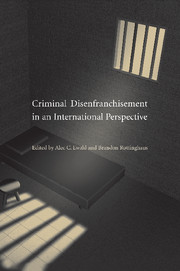Book contents
- Frontmatter
- Contents
- Contributors
- Foreword: Waves of Democracy and Criminal Disenfranchisement
- Acknowledgments
- Introduction
- Part I CONTEMPORARY DISENFRANCHISEMENT LAW
- Part II DISENFRANCHISEMENT IN COMPARATIVE PERSPECTIVE: LEGAL AND POLITICAL APPROACHES
- Part III VOTING RIGHTS AND PEOPLE WITH CRIMINAL CONVICTIONS: CASE STUDIES
- 6 The Politics and Legality of Prisoner Disenfranchisement in Australian Federal Elections
- 7 The Campaign for Prisoner Voting Rights in Ireland
- 8 The Ballot as a Bulwark: Prisoners' Right to Vote in South Africa
- 9 The Right to Vote in Danish Prisons
- 10 In Defense of Prisoner Disenfranchisement
- Index
- References
10 - In Defense of Prisoner Disenfranchisement
Published online by Cambridge University Press: 03 July 2009
- Frontmatter
- Contents
- Contributors
- Foreword: Waves of Democracy and Criminal Disenfranchisement
- Acknowledgments
- Introduction
- Part I CONTEMPORARY DISENFRANCHISEMENT LAW
- Part II DISENFRANCHISEMENT IN COMPARATIVE PERSPECTIVE: LEGAL AND POLITICAL APPROACHES
- Part III VOTING RIGHTS AND PEOPLE WITH CRIMINAL CONVICTIONS: CASE STUDIES
- 6 The Politics and Legality of Prisoner Disenfranchisement in Australian Federal Elections
- 7 The Campaign for Prisoner Voting Rights in Ireland
- 8 The Ballot as a Bulwark: Prisoners' Right to Vote in South Africa
- 9 The Right to Vote in Danish Prisons
- 10 In Defense of Prisoner Disenfranchisement
- Index
- References
Summary
In this chapter, I argue that limited disenfranchisement of prisoners is normatively consistent with liberal democratic principles. I make this argument in full recognition that it runs counter to the emerging consensus of constitutional courts outside of the United States (see European Court of Human Rights [ECHR] 2005). Indeed, the argument I make here was rejected – although by only one vote – by the Supreme Court of Canada in Sauvé v. Canada (Supreme Court of Canada 2002, hereafter Sauvé [No. 2]). That decision, of course, stands in stark contrast to the controlling judgment of the U.S. Supreme Court on the same issue. In Richardson v. Ramirez (U.S. Supreme Court 1974), a six-justice majority of the U.S. Supreme Court held that states possess broad constitutional authority to disenfranchise persons convicted of crimes. The majority based its decision on section 2 of the Fourteenth Amendment, which allows states to deny citizens the right to vote “for participation in rebellion, or other crime.” According to Justice William Rehnquist, the text of section 2 establishes an “affirmative sanction” for the “exclusion of felons from the vote” that was broad enough to justify even permanent disenfranchisement of convicted persons. Despite scholarly criticism (Tribe 1988: 1094; Note 1989: 1300–17), Richardson has remained settled law in the United States.
The Canadian Court's majority judgment in Sauvé (No. 2), authored by Chief Justice Beverley McLachlin, was dismissive – to the point of hostility – toward the state of American law in this area.
- Type
- Chapter
- Information
- Criminal Disenfranchisement in an International Perspective , pp. 259 - 280Publisher: Cambridge University PressPrint publication year: 2009
References
- 1
- Cited by

